Joseph von Laßberg | |
|---|---|
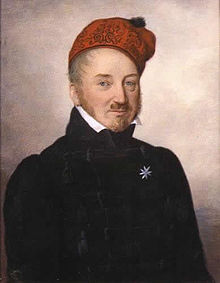 | |
| Born | April 10, 1770 |
| Died | March 15, 1855 (aged 84) |
| Nationality | German |
| Occupation | Antiquarian |
Baron Joseph Maria Christoph von Lassberg (b. Donaueschingen, 10 April 1770; d. 15 March 1855) was a German antiquary.
Joseph von Laßberg | |
|---|---|
 | |
| Born | April 10, 1770 |
| Died | March 15, 1855 (aged 84) |
| Nationality | German |
| Occupation | Antiquarian |
Baron Joseph Maria Christoph von Lassberg (b. Donaueschingen, 10 April 1770; d. 15 March 1855) was a German antiquary.

He was descended from an old Catholic noble family originated from Austria. His father Joseph Maria Freiherr von Laßberg (1731-1813) held the position of Chief Forester in the service of Prince zu Fürstenberg. His mother was Baroness Anna von Maltzahn, who also came from one of the oldest and most distinguished North German noble families.
After a brief service in the army, he entered the University of Strasbourg and later that of Freiburg im Br. to study law and economics, especially forestry. From 1789 he was in the service of Prince von Fürstenberg, becoming chief warden of the forests in 1804. Princess Elisabeth, who ruled the principality during the minority of her son Karl Egon, showed him marked favor. He became privy councillor in 1806, and accompanied her on her travels through Switzerland, Italy, and England. When the regency ended in 1817, Lassberg resigned his position and retired to private life, residing first on his estate at Eppishausen in Thurgau, and from 1838 at Castle Meersburg on Lake Constance. He now devoted himself to the study of German literature, and in the pursuit of these studies he collected a library of upwards of 12,000 books and 273 valuable manuscripts, among which was the codex of the Nibelungenlied (known as the Hohenems manuscript and commonly designated as C). Before his death he sold this library to the Fürstlich Fürtenbergischen Hofbibliothek at Donaueschingen.
Lassberg was very hospitably inclined and many visitors were entertained at Castle Meersburg. Ludwig Uhland, Karl Lachmann, Gustav Schwab, and other distinguished men of letters were among his friends. He was twice married, his second wife being Baroness Maria Anna von Droste-Hülshoff, a sister of the famous poet Annette.
His literary work consisted chiefly in editing medieval German poems, many of which were published under the pseudonym of Meister Sepp von Eppishusen. Among them were:
This article includes a list of references, related reading, or external links, but its sources remain unclear because it lacks inline citations .(July 2014) |

The Nibelungenlied, translated as The Song of the Nibelungs, is an epic poem written around 1200 in Middle High German. Its anonymous poet was likely from the region of Passau. The Nibelungenlied is based on an oral tradition of Germanic heroic legend that has some of its origin in historic events and individuals of the 5th and 6th centuries and that spread throughout almost all of Germanic-speaking Europe. Scandinavian parallels to the German poem are found especially in the heroic lays of the Poetic Edda and in the Völsunga saga.

Baroness Anna Elisabeth Franziska Adolphine Wilhelmine Louise Maria von Droste zu Hülshoff, known as Annette von Droste-Hülshoff, was a 19th-century German poet, novelist, and composer of Classical music. She was also the author of the novella Die Judenbuche.
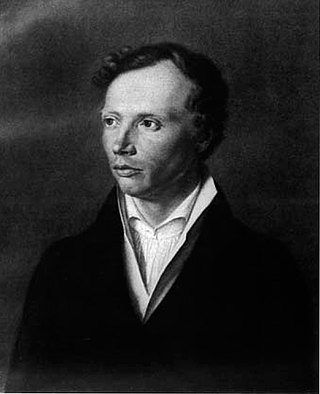
Johann Ludwig Uhland was a German poet, philologist, literary historian, lawyer and politician.
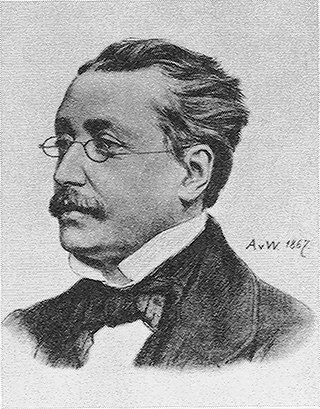
Joseph Victor von Scheffel was a German poet and novelist.
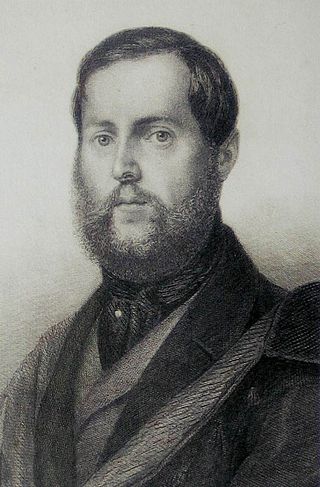
Levin Schücking was a German novelist. He was born near Meppen, Kingdom of Prussia, and died in Bad Pyrmont, German Empire. He was the uncle of Levin Ludwig Schücking.

Donaueschingen is a German town in the Black Forest in the southwest of the federal state of Baden-Württemberg in the Schwarzwald-Baar Kreis. It stands near the confluence of the two sources of the river Danube.
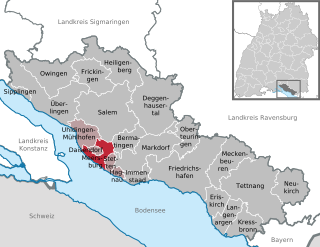
Meersburg is a town in Baden-Württemberg in the southwest of Germany. It is on Lake Constance.

Count Anton Alexander von Auersperg, also known under the name Anastasius Grün, was an Austrian poet and liberal politician from Carniola, a former Habsburg crown land in today's Slovenia.

The House of Fürstenberg is the name of an old and influential Swabian noble house in Germany, based primarily in what is today southern Baden-Württemberg near the source of the Danube river. Numerous members of the family have risen to prominence over the centuries as soldiers, churchmen, diplomats, and academics. Sometimes the name is gallicized as de Furstenberg or anglicized as Furstenberg.

The Zimmern Chronicle is a family chronicle describing the lineage and history of the noble family of Zimmern, based in Meßkirch, Germany. It was written in a Swabian variety of Early New High German by Count Froben Christoph of Zimmern (1519–1566). The chronicle is an eminent historical source of information about 16th century nobility in South-West Germany, its culture and its values. It is also an important literary and ethnological source for its many folkloristic texts. The text has survived in two manuscripts, both in possession of the Württembergische Landesbibliothek in Stuttgart.

Meersburg Castle, also known as the Alte Burg, in Meersburg on Lake Constance in Baden-Württemberg, Germany, is considered to be one of the oldest inhabited castles in Germany. The central tower was first built during the 7th century, though the original structure is no longer visible. Burg Meersburg is known as the old castle, in the reference to the neighboring 18th century New Castle.

Joseph Wilhelm Ernst, Prince of Fürstenberg was a prince of Fürstenberg-Fürstenberg who changed his residence to Donaueschingen, at the head of the Danube, and thus converted the existing settlement into a town.
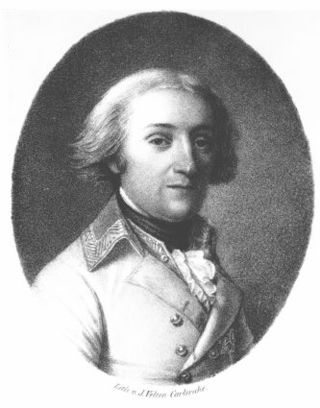
Karl Aloys zu Fürstenberg was an Austrian military commander. He achieved the rank of Field Marshal and died at the Battle of Stockach.

The House of Khevenhüller is the name of an old and important Carinthian noble family, documented there since 1356, with its ancestral seat at Landskron Castle. In the 16th century, the family split into the two branches of Khevenhüller-Frankenburg, Imperial Counts from 1593, and Khevenhüller-Hochosterwitz, raised to Imperial Counts in 1725 and, as Khevenhüller-Metsch, to princely rank (Fürsten) in 1763. The family belongs to high nobility.

The Lochamer-Liederbuch is an extensive collection of German songs at the transition from the late Middle Ages to the Renaissance. It dates from the mid-15th century and is regarded as one of the most important surviving collections of music from fifteenth-century Germany. Other names are Locheimer and Lochheimer Liederbuch.

Charles Egon II, Prince of Fürstenberg was a German politician and nobleman. From 1804 to 1806 he was the last sovereign prince of Furstenburg before its mediatisation, whilst still in his minority. He also served as the first-ever vice-president of the Upper Chamber of the Badische Ständeversammlung.

Karl Joachim Aloys Franz von Paula zu Fürstenberg-Stühlingen was a German nobleman and member of the House of Fürstenberg. He was born and died in Donaueschingen and from 1796 to 1804 was the eighth reigning Prince of Fürstenberg.

Joseph Wenzel zu Fürstenberg-Stühlingen was a German nobleman and from 1762 to 1783 the sixth ruling Prince of Fürstenberg.
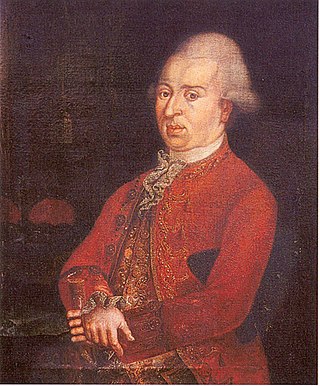
Joseph Maria Benedikt zu Fürstenberg-Stühlingen was a German nobleman and from 1783 until his death the seventh reigning prince of Fürstenberg. He was born in Donaueschingen, where he also died. He was the eldest son of Joseph Wenzel zu Fürstenberg and his wife Maria Josepha von Waldburg-Scheer-Trauchburg. He died childless and was succeeded by his younger brother Karl Joachim.